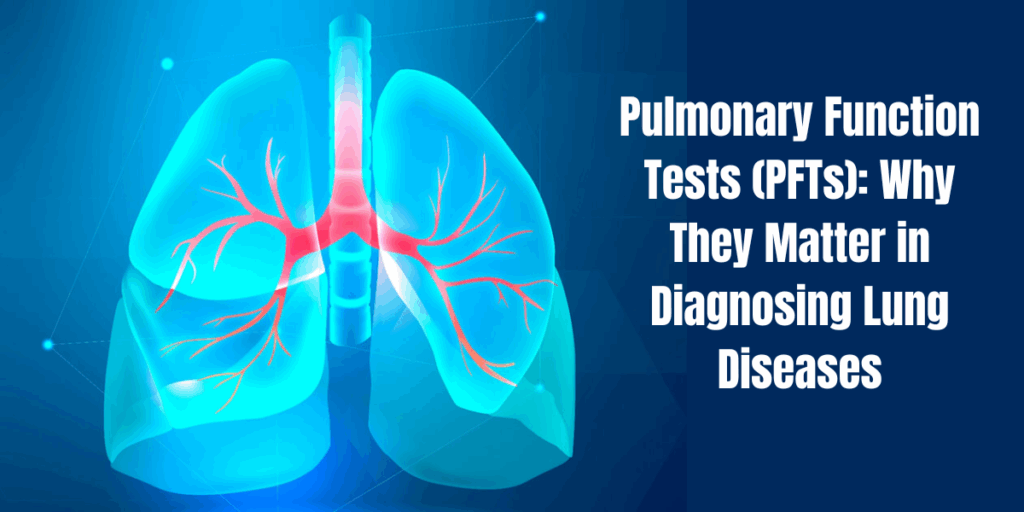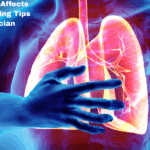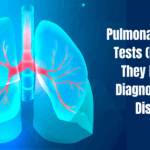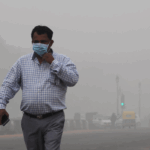
Breathing is something we often take for granted—until it becomes difficult. Shortness of breath, chronic cough, wheezing, or tightness in the chest may signal an underlying lung issue. When these symptoms arise, one of the most important diagnostic tools a pulmonologist relies on is a Pulmonary Function Test (PFT).
But what exactly is a PFT, and why is it so vital in understanding lung health? Let’s dive in.
What Are Pulmonary Function Tests (PFTs)?
Pulmonary Function Tests (PFTs) are a group of non-invasive tests that measure how well your lungs are working. They help assess:
- How much air your lungs can hold
- How fast you can move air in and out
- How efficiently your lungs exchange oxygen and carbon dioxide
These tests are essential for diagnosing, monitoring, and managing a wide range of respiratory conditions.
Why Are PFTs So Important?
Lung diseases often present with similar symptoms—shortness of breath, fatigue, persistent cough—but the underlying causes can vary widely. PFTs help pulmonologists pinpoint the exact problem.
Here’s why PFTs matter:
✅ Early Diagnosis of Lung Diseases
Many respiratory conditions like asthma, chronic obstructive pulmonary disease (COPD), interstitial lung disease (ILD), and even lung fibrosis begin subtly. PFTs can detect abnormalities before symptoms become severe, enabling early intervention.
✅ Differentiating Between Lung Conditions
Symptoms like breathlessness can be caused by asthma, heart disease, or even anxiety. PFTs help distinguish between obstructive lung diseases (like asthma or COPD) and restrictive diseases (like ILD or scoliosis affecting the chest wall), allowing for accurate diagnosis and treatment.
✅ Monitoring Disease Progression
For patients already diagnosed with a lung condition, PFTs are critical in tracking how the disease is progressing and whether treatments are effective.
✅ Pre-Surgical Evaluation
Before undergoing major surgeries, especially those involving the heart or lungs, doctors often recommend PFTs to assess whether a patient’s lungs can tolerate the stress of surgery.
✅ Assessing Impact of Occupational Hazards
For individuals exposed to dust, fumes, or chemicals in workplaces, PFTs can be a preventive measure to check for lung damage even before symptoms appear.
Types of Pulmonary Function Tests
PFTs can be done using different methods, depending on what the pulmonologist wants to assess:
1. Spirometry
This is the most common PFT. It measures how much air you can inhale and exhale and how quickly you can blow air out. It’s extremely useful in diagnosing asthma and COPD.
2. Lung Volume Tests
These tests determine the total volume of air your lungs can hold. They help identify restrictive lung diseases.
3. Diffusion Capacity Test (DLCO)
This test checks how well oxygen moves from the lungs into the bloodstream. It’s often used for diagnosing ILD or pulmonary hypertension.
What to Expect During a PFT
PFTs are simple, safe, and painless. The test usually involves:
- Sitting or standing in a designated space
- Breathing into a mouthpiece connected to a spirometer
- Following breathing instructions (deep inhalation, forceful exhalation, etc.)
You may be asked to avoid bronchodilators (inhalers) before the test. The whole procedure typically takes around 30–45 minutes.
Who Should Get a PFT Done?
You should consider a PFT if you:
- Have persistent cough, wheezing, or breathlessness
- Have been diagnosed with asthma, COPD, or ILD
- Have a family history of lung disease
- Smoke or have smoked in the past
- Work in a high-risk industry (construction, mining, chemical plants)
- Need evaluation before surgery
Why You Should See a Pulmonologist for PFTs
PFTs are only effective when interpreted correctly. A qualified chest physician or pulmonologist evaluates the results in the context of your symptoms, medical history, and lifestyle. This helps in forming a personalized treatment plan, whether that involves medication, lifestyle changes, or further testing.
Summary
Your lungs play a vital role in keeping every organ of your body functioning optimally. Don’t wait for serious symptoms to get your lungs checked. Pulmonary Function Tests are simple, quick, and immensely helpful in catching problems early and managing chronic lung conditions more effectively.
If you’re experiencing any persistent breathing issues or are concerned about your lung health, don’t ignore the signs. Timely consultation and proper diagnosis can make all the difference.
For expert evaluation and advanced lung care, consult Dr. Yogesh Agrawal, one of the leading pulmonologists in Thergaon, Pune. His experience and patient-centered approach make him a trusted name in respiratory care across Pune and PCMC.




